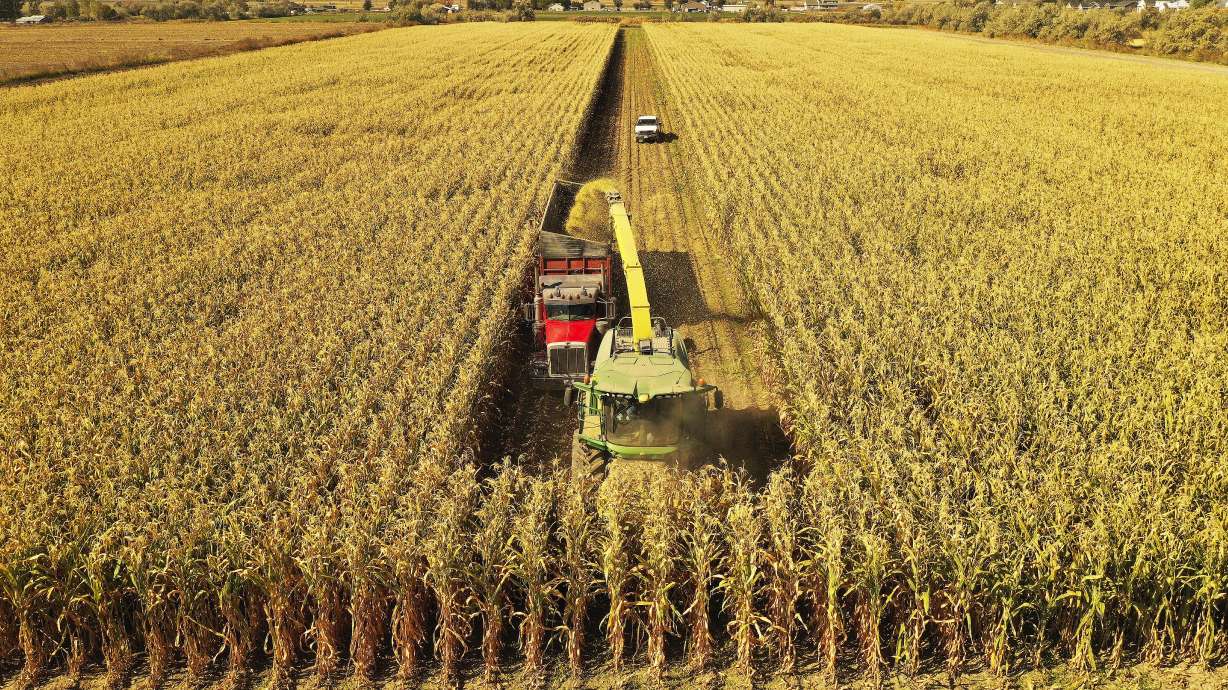Estimated read time: 3-4 minutes
This archived news story is available only for your personal, non-commercial use. Information in the story may be outdated or superseded by additional information. Reading or replaying the story in its archived form does not constitute a republication of the story.
SALT LAKE CITY — Utah Republican Sen. Mitt Romney and his Democratic colleague from Colorado, Sen. Michael Bennet, are urging the U.S. Department of Agriculture to do more to support the West's farmers and ranchers amid crippling drought.
In a bipartisan letter signed Wednesday, Romney; Bennet; Sen. Mike Lee, R-Utah; and 12 other senators asked Agriculture Secretary Tom Vilsack "to give parity to the needs of our states as Western growers and communities face these dire conditions."
That includes equally distributing funds from the bipartisan infrastructure package, of which billions are available for agriculture and water systems, and $20 billion Congress recently set aside for USDA conservation programs.
The letter also asks Vilsack's department to use "existing authorities" to support Western water conservation projects, help improve infrastructure and efficiency, protect land susceptible to erosion and drought, extend technical assistance to farmers and ranchers particularly affected by climate change, and "restore western rangelands' ability to retain water by reconnecting floodplains to incised streams."
"Utah and the American West is facing an historic drought, and our state's farmers and ranchers are taking immediate action to be more water-conscious while still maintaining their livelihood," Romney said in a statement to the Deseret News.
The Colorado River, which supports the billion-dollar agriculture and recreation industries and provides water to over 40 million people, is one of the best indicators of drought — Lake Powell is now in such a dire situation that some projections from the Bureau of Reclamation say the Glen Canyon Dam could stop generating power as soon as next summer.
According to federal data, nearly 50% of the entire U.S. is currently experiencing moderate to exceptional drought, with the country's hardest hit regions in the West.
At least 52% of Utah is in extreme drought, according to the state's Department of Natural Resources — as of November, 37 of the 47 reservoirs monitored by the state are below 55% capacity.
Related:
Farmers and ranchers use the lion's share of the water allocated across the Colorado River Basin and other parts of the western U.S., and are especially vulnerable to the drought.
"We had a lot (of cattle) that died because of the drought. We lost a lot, like maybe 50 or 60 heads," said Christine Rock, a rancher on the Navajo Nation in Utah, who helps tend to her family's herd of roughly 100 cows.
Rock was able to get some compensation through the USDA — however she says the drought is making her livelihood increasingly unpredictable, and expensive. If anything, she says, her family will likely continue to scale back the number of cattle it looks after.
"It's imperative that USDA programs — including funding — accurately recognize the important role of Utah's farmers and ranchers in tackling the drought crisis. Ensuring that the West receives parity from the USDA will help bolster our states' rural economies and support our producers as they implement these important changes," Romney said.
It's imperative that USDA programs — including funding — accurately recognize the important role of Utah's farmers and ranchers in tackling the drought crisis.
–Sen. Mitt Romney, R-Utah
In the letter, Romney and the other senators call for the USDA to explore "more creative and tailored solutions," claiming that some existing programs are not suited to the needs of Western farmers and ranchers.
"Many of these practices, like water conservation, cover crops and restoration of Western rangelands' drought resilience, provide multiple benefits such as enhanced soil carbon storage and would be eligible for various new funding sources," the letter reads.
The letter also asks the USDA for increased coordination with states, local and tribal governments, and directs the department to address its understaffed field offices and "prioritize hiring staff with expertise in Western production agriculture."
"The current lack of engineers and experts on USDA staff regarding Western water conservation has delayed many projects for Western growers," the senators say.
In addition to Bennet, Romney and Lee, the letter was also signed by Sens. Krysten Sinema, D-Ariz.; Ben Ray Luján, D-N.M.; Dianne Feinstein, D-Calif.; John Hickenlooper, D-Colo.; Mark Kelley, D-Ariz.; Martin Heinrich, D-N.M.; Ron Wyden, D-Ore.; Jacky Rosen, D-Nev.; Catherine Cortez Masto, D-Nev.; Alex Padilla, D-Calif.; Jeffery Merkley, D-Ore.; and Patty Murray, D-Wash.











